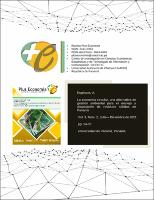¿Puede el salario mínimo agotar la economía de bienestar y frenar la economía digital?
Resumen
Abstract:
This is study of Principles of Political Economy, applied to the transition from welfare state economy to digital economy, with mention to the risk in the adoption of measures that aggravate the COVID19 crisis. The paper uses a mix of analytical and empirical techniques; this paper seeks to offer a diagnosis and forecast of the troubles in the labour market, with its risks of polarization and collapse. It turns out that new collaborators require new regulation and economic policies, and not anartificial fit in old figures, which prevent a correct and compatible transition between paradigms. Resumen:
Este es un estudio de Principios de Economía Política, aplicado al tránsito de la economía de bienestar estatal a la economía digital, con atención al riesgo de adoptar medidas que agraven la crisis de COVID19. Mediante el uso combinando de técnicas analíticas y empíricas, se busca ofrecer un diagnóstico y pronóstico de los problemas del mercado de trabajo, con sus riesgos de polarización y colapso. Resulta que los nuevos colaboradores requieren de regulación y políticas económicas nuevas, y no de un artificial encaje en figuras viejas, que impiden un tránsito correcto y compatible entre paradigmas.
URI
http://jadimike.unachi.ac.pa/handle/123456789/727https://revistas.unachi.ac.pa/index.php/pluseconomia/article/view/518

